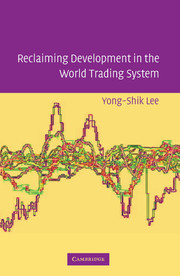Book contents
- Frontmatter
- Contents
- List of Abbreviations
- Acknowledgments
- 1 Poverty, Economic Development, and International Trade
- 2 Current Regulatory Framework for International Trade: The WTO System
- 3 Reclaiming Development: Tariff Bindings and Subsidies
- 4 Anti-Dumping and Safeguards
- 5 “Expansion” of Trade Disciplines and Development
- 6 Foreign Direct Investment and Regional Trade Liberalization
- 7 Conclusion: Putting Back the Ladder
- Epilogue
- Bibliography
- Index
7 - Conclusion: Putting Back the Ladder
Published online by Cambridge University Press: 18 August 2009
- Frontmatter
- Contents
- List of Abbreviations
- Acknowledgments
- 1 Poverty, Economic Development, and International Trade
- 2 Current Regulatory Framework for International Trade: The WTO System
- 3 Reclaiming Development: Tariff Bindings and Subsidies
- 4 Anti-Dumping and Safeguards
- 5 “Expansion” of Trade Disciplines and Development
- 6 Foreign Direct Investment and Regional Trade Liberalization
- 7 Conclusion: Putting Back the Ladder
- Epilogue
- Bibliography
- Index
Summary
I wrote this book on the premise that the economic development of developing countries should be considered a priority for moral, economic, human rights, and security reasons and that the international trading system should provide an adequate regulatory framework that allows developing countries to adopt effective development policies. These policies include a state promotion of infant industries through export facilitations and trade protections. A careful examination of the WTO provisions leads to the conclusion that the current WTO disciplines are not sufficient to facilitate development, and some of these provisions in fact prohibit developing countries from adopting effective development policies. With this conclusion, I have explored the ways in which we may better promote economic development, while preserving the current basis of multilateral trade disciplines.
We can provide a more development-friendly regulatory environment for trade by carefully calibrating preferential treatment to developing countries without altering the current regulatory framework for open trade in a fundamental way. To facilitate development, I have introduced the concept of the “sliding scale” in the DFT and DFS that would allow differentiated treatment to developing countries according to their respective development stages gauged by income levels. I also suggest the exemption of imports from developing countries from AD measures. The current AD disciplines are dubious and ambiguous in nature and have become a major impediment to trade of both developed and developing countries.
- Type
- Chapter
- Information
- Reclaiming Development in the World Trading System , pp. 156 - 165Publisher: Cambridge University PressPrint publication year: 2006



